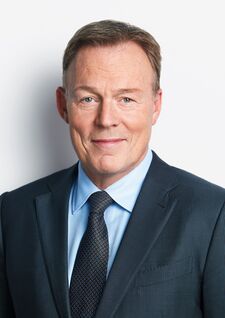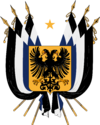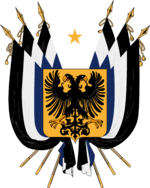Kaspar Vahl: Difference between revisions
No edit summary |
|||
| Line 4: | Line 4: | ||
|image = Kaspar Vahl, December 2019.jpg | |image = Kaspar Vahl, December 2019.jpg | ||
|image_size = 225 | |image_size = 225 | ||
|caption = | |caption = State photo, 2019 | ||
|office = [[Chancellor of Vierzland]] | |office = [[Chancellor of Vierzland]] | ||
|deputy= [[Tilman Kohl]]<br>[[Nick Krämer]] | |deputy= [[Tilman Kohl]]<br>[[Nick Krämer]] | ||
| Line 22: | Line 22: | ||
|term_start3 = 15 February 1992 | |term_start3 = 15 February 1992 | ||
|term_end3 = | |term_end3 = | ||
|predecessor3 = | |predecessor3 = ''Position established'' | ||
|successor3 = | |successor3 = | ||
| Line 49: | Line 49: | ||
Vahl was born in [[Heglitz]] in 1958 to a middle-class family. In 1976, he was conscripted into the [[Imperial Vierz Army]] and saw combat in the [[Operation Modi|invasion of Luepola]] in 1979. He was honorably discharged from the army in 1983, after which he studied law at the [[Constantine Imperial University of Adtrus]]. He graduated in 1989 and began practicing civil law in [[Strauben]]. After the [[Werner Declaration|dissolution]] of the [[Vierz Empire]] in 1990, Vahl joined the [[United Republicans (Vierzland)|United Republicans]] and was elected representative for [[Geismar]]'s 1st district in the [[1992 Vierz general election|1992 election]] at the age of 34. In 2000, Vahl left the United Republicans during the [[Higmon Affair]] scandal and joined the newly-formed [[National Democratic Party (Vierzland)|National Democratic Party]]. He became deputy chairman of the NDP in 2007 and chairman in 2010. In the [[2012 Vierz general election|2012 elections]], the NDP secured a majority of seats and formed a {{wp|majority government}} with Vahl as [[Chancellor of Vierzland|Chancellor]]. | Vahl was born in [[Heglitz]] in 1958 to a middle-class family. In 1976, he was conscripted into the [[Imperial Vierz Army]] and saw combat in the [[Operation Modi|invasion of Luepola]] in 1979. He was honorably discharged from the army in 1983, after which he studied law at the [[Constantine Imperial University of Adtrus]]. He graduated in 1989 and began practicing civil law in [[Strauben]]. After the [[Werner Declaration|dissolution]] of the [[Vierz Empire]] in 1990, Vahl joined the [[United Republicans (Vierzland)|United Republicans]] and was elected representative for [[Geismar]]'s 1st district in the [[1992 Vierz general election|1992 election]] at the age of 34. In 2000, Vahl left the United Republicans during the [[Higmon Affair]] scandal and joined the newly-formed [[National Democratic Party (Vierzland)|National Democratic Party]]. He became deputy chairman of the NDP in 2007 and chairman in 2010. In the [[2012 Vierz general election|2012 elections]], the NDP secured a majority of seats and formed a {{wp|majority government}} with Vahl as [[Chancellor of Vierzland|Chancellor]]. | ||
Domestically, Vahl passed economic reforms to tackle {{wp|stagflation}} | Domestically, Vahl passed economic reforms to tackle {{wp|stagflation}} by lowering income taxes and inflation rates, and providing financial stimuli for businesses. His first government implemented {{wp|welfare reform}} and enacted tax credit programs for families. Vahl oversaw immigration reform to reduce what he perceived as over-immigration and make the process more favourable towards high-skilled immigrants. In foreign affairs, Vahl ended Vierzland's associate membership in the [[Union of Patyrian States]], ordered the deployment of troops to [[Ekalla]], and made a [[wikipedia:State visit|state visits]] to the [[Aitic Federation]] and [[Bhasar]]. He has overseen a sharp increase in military spending for much of his term. | ||
During Vahl's first term, the economy grew by 2.3% on average each year | During Vahl's first term, the economy grew by 2.3% on average each year and unemployment decreased to below 5%. Critics have charged Vahl with engineering {{wp|democratic backsliding}} by increasing restrictions on independent media and reducing the role of the judiciary in governance. Vahl's statements have often been the subject of domestic and international controversy, and he has received accusations of {{wp|xenophobia}}, {{wp|homophobia}}, and {{wp|chauvinism}}. He has characterized himself as a [[wikipedia:Nationalism|nationalist]] and a [[wikipedia:Traditional conservatism|traditional conservative]]. He is sharply critical of {{wp|monarchism}} and {{wp|clericalism}} and has reinforced the exile of [[Adalbert of Vierzland|Prince Adalbert]], the {{wp|pretender}} to the Vierz monarchy that was abolished in 1990. | ||
Vahl was reelected Chancellor after the [[2017 Vierz general election|2017 elections]], in which the NDP increased its legislative majority. He intends to run for a third and final term in the [[2022 Vierz general election|2022 elections]]. It has been rumoured that Vahl and the NDP want to amend the constitution to re-introduce the [[President of Vierzland|presidency]], which was abolished in 1998, for the [[2027 Vierz general election|2027 elections]], with Vahl intending to run for the position. | Vahl was reelected Chancellor after the [[2017 Vierz general election|2017 elections]], in which the NDP increased its legislative majority. He intends to run for a third and final term in the [[2022 Vierz general election|2022 elections]]. It has been rumoured that Vahl and the NDP want to amend the constitution to re-introduce the [[President of Vierzland|presidency]], which was abolished in 1998, for the [[2027 Vierz general election|2027 elections]], with Vahl intending to run for the position. | ||
Revision as of 16:52, 12 January 2021
This article is incomplete because it is pending further input from participants, or it is a work-in-progress by one author. Please comment on this article's talk page to share your input, comments and questions. Note: To contribute to this article, you may need to seek help from the author(s) of this page. |
Kaspar Vahl | |
|---|---|
 State photo, 2019 | |
| Chancellor of Vierzland | |
| Assumed office 16 February 2012 | |
| Deputy | Tilman Kohl Nick Krämer |
| Preceded by | Erhardt Preisner |
| Chairman of the National Democratic Party | |
| Assumed office 6 July 2010 | |
| Deputy | Adrian Wentz Tilman Kohl |
| Preceded by | Torben Hansch |
| Member of the Federal Assembly from Geismar's 1st district | |
| Assumed office 15 February 1992 | |
| Preceded by | Position established |
| Personal details | |
| Born | Kaspar Franz Vahl 29 March 1958 Heglitz, Geismar, Vierz Empire |
| Political party | National Democratic Party (2000–present) |
| Other political affiliations | United Republicans (1992–2000) |
| Spouse | Kathrin Vahl (m. 1983) |
| Children | 1 |
| Alma mater | Constantine Imperial University of Adtrus |
| Awards | Black Cross First Class Imperial Cross First Class Heart of Steel |
| Military service | |
| Allegiance | |
| Branch/service | Imperial Vierz Army |
| Years of service | 1976–1983 |
| Rank | |
| Unit |
|
| Battles/wars | Luepolan War |
 |
|---|
| This article is part of a series on the politics and government of Vierzland |
Kaspar Franz Vahl (born 29 March 1958) is a Vierz politician who has been serving as the Chancellor of Vierzland since 2012 and chairman of the National Democratic Party since 2010. He is also the current representative of Geismar's 1st district in the Federal Assembly, a position he was elected to in 1992.
Vahl was born in Heglitz in 1958 to a middle-class family. In 1976, he was conscripted into the Imperial Vierz Army and saw combat in the invasion of Luepola in 1979. He was honorably discharged from the army in 1983, after which he studied law at the Constantine Imperial University of Adtrus. He graduated in 1989 and began practicing civil law in Strauben. After the dissolution of the Vierz Empire in 1990, Vahl joined the United Republicans and was elected representative for Geismar's 1st district in the 1992 election at the age of 34. In 2000, Vahl left the United Republicans during the Higmon Affair scandal and joined the newly-formed National Democratic Party. He became deputy chairman of the NDP in 2007 and chairman in 2010. In the 2012 elections, the NDP secured a majority of seats and formed a majority government with Vahl as Chancellor.
Domestically, Vahl passed economic reforms to tackle stagflation by lowering income taxes and inflation rates, and providing financial stimuli for businesses. His first government implemented welfare reform and enacted tax credit programs for families. Vahl oversaw immigration reform to reduce what he perceived as over-immigration and make the process more favourable towards high-skilled immigrants. In foreign affairs, Vahl ended Vierzland's associate membership in the Union of Patyrian States, ordered the deployment of troops to Ekalla, and made a state visits to the Aitic Federation and Bhasar. He has overseen a sharp increase in military spending for much of his term.
During Vahl's first term, the economy grew by 2.3% on average each year and unemployment decreased to below 5%. Critics have charged Vahl with engineering democratic backsliding by increasing restrictions on independent media and reducing the role of the judiciary in governance. Vahl's statements have often been the subject of domestic and international controversy, and he has received accusations of xenophobia, homophobia, and chauvinism. He has characterized himself as a nationalist and a traditional conservative. He is sharply critical of monarchism and clericalism and has reinforced the exile of Prince Adalbert, the pretender to the Vierz monarchy that was abolished in 1990.
Vahl was reelected Chancellor after the 2017 elections, in which the NDP increased its legislative majority. He intends to run for a third and final term in the 2022 elections. It has been rumoured that Vahl and the NDP want to amend the constitution to re-introduce the presidency, which was abolished in 1998, for the 2027 elections, with Vahl intending to run for the position.
